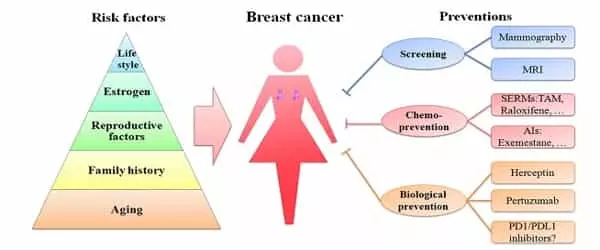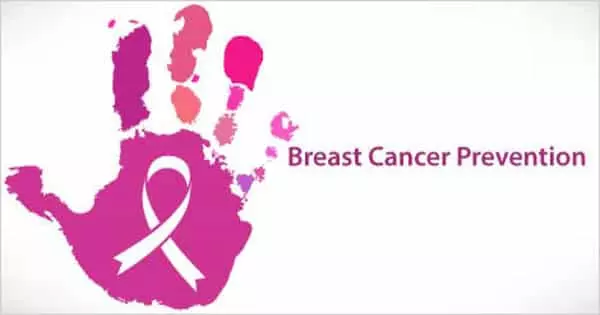Breast cancer is the most common cause of death in women. Breast cancer is the second leading cause of cancer mortality in women in the United States, trailing only lung cancer. Breast cancer is the most common cancer among women in Saudi Arabia, accounting for 20.6 percent of all cancers. The frequency of treatment failure and cause-specific death is proportional to the stage of cancer at the time of presentation. More than 90% of patients with stage I disease have no evidence of breast cancer 10 years after receiving appropriate treatment, whereas patients with stage VI disease are incurable and only require palliative care.
According to the researchers, advances in breast cancer prevention research have resulted in new and innovative ways to modify breast cancer risk and potentially reduce breast cancer incidence and mortality.
According to a commentary published in the Journal of Clinical Oncology Practice by Mayo Clinic Cancer Center researchers, advances in breast cancer prevention research have resulted in new and innovative opportunities to modify breast cancer risk and potentially reduce breast cancer incidence and mortality.
Researchers suggest that advances in breast cancer prevention research have resulted in new and innovative opportunities to modify breast cancer risk and potentially reduce breast cancer incidence and mortality.
“It is prudent for health care providers to be knowledgeable about the benefits of assessing individual breast cancer risk, and to counsel and implement risk-reduction strategies with their patients,” says Sandhya Pruthi, M.D., a Mayo Clinic internist and the commentary’s author.
According to Dr. Pruthi, evidence-based risk-lowering strategies include lifestyle changes, preventive anti-estrogen medications, surveillance breast imaging, and genetic testing. Women who are at high risk of having a hereditary breast cancer mutation should consider prophylactic surgery to lower their risk.
“Physicians should recommend individualized risk assessments for their patients and counsel them on interventions ranging from lifestyle changes to the use of preventive (anti-estrogen) medications or conjugated equine estrogen,” Dr. Pruthi says.
She believes that these strategies may be useful in reducing hormone-sensitive breast cancer tumors with a good prognosis, as well as in preventing tumors that are not hormone-sensitive and have a poor prognosis.

“For many years, breast cancer prevention research has primarily focused on the use of anti-estrogen medications to reduce the incidence of favorable, hormone-sensitive breast cancers,” says Dr. Pruthi. “However, it is critical that we reexamine and implement other risk-reducing strategies to prevent unfavorable breast cancers, known as triple-negative tumors.”
She encourages women and their healthcare providers to consider a comprehensive approach to breast cancer prevention, which includes risk assessment, awareness of modifiable lifestyle factors, such as low-fat dietary interventions, and the use of medications that reduce the risk of dying from breast cancer.
According to Dr. Pruthi, her commentary is based on research from two large randomized clinical trials: the Women’s Health Initiative Dietary Modification Trial and the Women’s Health Initiative randomized trial with conjugated equine estrogen in women who have had a previous hysterectomy. She claims that both clinical trials showed a decrease in breast cancer deaths.
Current breast cancer prevention strategies include primary prevention, such as avoiding tobacco, exogenous hormone use, and excessive ionizing radiation exposure, maintaining a normal weight, exercising, breastfeeding, eating a healthy diet, and limiting alcohol consumption.
Sexual behavior, alcohol consumption, physical activity, and obesity are all risk factors for breast cancer. Women who engage in heavy manual labor or strenuous exercise have a low risk of developing breast cancer. Physical activity’s protective mechanism is unknown, but it may have an effect on the endogenous hormone.
A healthy diet may reduce your risk of certain types of cancer, as well as diabetes, heart disease, and stroke. Women who eat a Mediterranean diet supplemented with extra-virgin olive oil and mixed nuts, for example, may have a lower risk of breast cancer. The Mediterranean diet emphasizes plant-based foods like fruits and vegetables, whole grains, legumes, and nuts. People who follow the Mediterranean diet prefer healthy fats like olive oil to butter and prefer fish to red meat.
















